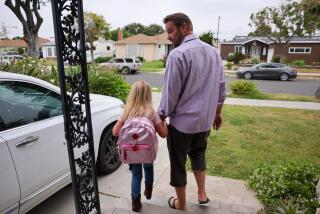FAMILY VICTORY : Handicapped Girl, 7, Wins Fight to Continue Taking Regular Classes
- Share via
Stephanie Stratford, a severely handicapped 7-year-old, has won her battle to continue attending regular classes in the Palos Verdes Peninsula school district.
Stephanie has been attending a regular kindergarten class under a state administrative order issued last September. But the district had been appealing the decision in federal court.
District vs. Parents
The controversy had pitted the district--which contended that the child was better off being taught by special education teachers--against Stephanie’s parents, Allan and Nancy Stratford, and state Department of Education officials, who argued that Stephanie should be in a regular classroom.
While declining to discuss details of the settlement--which was ordered sealed by U.S. District Judge Alicemarie Stotler--all parties in the case said they believe the litigation is over.
Nancy Stratford called the settlement a victory for her family. “We wanted Stephanie to attend a regular school, which she is going to do, without any other court battles,” she said.
But Sharon A. Watt, attorney for the school district, said it was a settlement in which there were no winners or losers. “All parties compromised somewhat in coming to a settlement,” she said.
Glad It’s Over
Supt. Jack Price said: “All of us are pleased that this long litigation and recrimination are over, and that we’re going to move forward to give Stephanie the best possible education that we can.”
Stephanie, who was born with a tumor on her spinal cord, is largely paralyzed from the neck down, according to legal documents in the case. She uses a motorized wheelchair, which she operates with a chin control, and requires a respirator to help her breathe. She also has had a tracheostomy--an incision in the trachea to create a breathing hole--which must be cleared occasionally by suctioning.
Stephanie can swallow food, but has a gastronomy tube to her stomach by which she also can be fed.
In the spring of 1987, Palos Verdes and Los Angeles County school officials decided that Stephanie should be in a class with other handicapped children. Her parents objected, and after a hearing, state administrative hearing officer Spencer Joe ordered last September that she be placed in a regular kindergarten class at Rancho Vista School in Rolling Hills Estates, the school nearest her home.
The district--which did not dispute that Stephanie is mentally alert and capable of kindergarten work--argued that placing her in a regular kindergarten class was impractical because of the constant medical attention she requires. It also said the classroom teacher would have to spend an inordinate amount of time with Stephanie, to the detriment of other students.
But Joe held that the district failed to provide convincing evidence that Stephanie is a “medically high-risk student.” He also said that federal law requires that handicapped children be educated with non-handicapped children to the “maximum extent possible.” The district’s decision to place her in a class for the orthopedically handicapped failed to meet that requirement, he said.
Stephanie was admitted to regular kindergarten, but the district in October appealed Joe’s ruling in a lawsuit filed in U.S. District Court in Los Angeles.
Two months later, the Stratfords--joined by the state Department of Education--filed their own suit in federal court, charging the district with intentionally obstructing the educational plan that Joe ordered for Stephanie.
Capable Child
Joyce Eckrem, an attorney for the education department, said the state sided with the Stratfords because “Stephanie is capable and, though a handicapped child, the evidence indicated she could participate in a regular classroom.”
In January, Judge Stotler declined to act in the federal suit until the education department formally investigated the Stratfords’ contention that Stephanie was not receiving all of the services specified in Joe’s order.
A subsequent investigation turned up some deficiencies involving training for Stephanie’s classroom aide, the child’s transportation to and from school and provision of a substitute when the aide was not available.
School district spokeswoman Nancy Mahr said in March that the training had been improved and the district was working to resolve the other issues. Stratford attorney Joan K. Honeycutt said Wednesday that all problems had been resolved, with the exception of the substitute.
Price said the district is trying to solve that problem by obtaining a waiver from the state requirement that substitutes have credentials as school nurses because such people are “difficult to find.” He said the waiver would allow the district to use nurses who regularly attend Stephanie in her home, obtained through a private service, on the rare occasions that the regular school nurse/aide is absent.
No Dismissal
The settlement brought the various legal proceedings to a halt, but all parties concede they could be resumed if the agreements unravel. “There is no final decree, not a dismissal of the action,” Honeycutt said. “If the terms of the settlement work out, it will be dismissed.”
Despite the sealing of settlement terms, some things have been disclosed. School district attorney Watt said that the education department has agreed to help the district with “some of the technical difficulties that have posed problems in educating a child with this severity of difficulty.”
Honeycutt said the Stratfords dropped any demands for monetary damages.
No one will disclose legal fees paid by the various parties or who is paying them, but Honeycutt said they “are several times more” than what it costs the district to provide a nurse/aide for Stephanie.
Price said the cost of the aide is between $30,000 and $40,000 for the school year.
The superintendent said Stephanie’s educational plan is a part of the settlement. “She will be in a regular first-grade classroom, receiving the same instruction as every other child receives,” he said. “She has a full time nurse/instructional aide who is trained to take care of Stephanie’s physical and educational needs.”
Mahr said Wednesday that the nurse/aide is with Stephanie at all times in the classroom. “She really has the responsibility for health care while Stephanie is at school, and to assist educationally,” Mahr said.
The nurse/aide monitors Stephanie’s breathing and adjusts the respirator when necessary. In a private room, the aide changes Stephanie’s diapers and suctions her tracheostomy when necessary.
Stephanie uses a mouth stylus to write and the nurse/aide changes paper for her and turns pages as she reads, Mahr said. She also works individually with Stephanie to make sure she understands class presentations.
Despite the settlement, school district attorney Watt said the district “has not changed its position” that “from an educational point of view” Stephanie should be in a special class.
For her part, attorney Honeycutt said Stephanie is “a terrific kid and is where she belongs.”
Nancy Stratford said Stephanie “had a good kindergarten experience,” but it could have been better if the nurse/aide had received more training. She said she wants the district to provide “more training and support” for the nurse/aide who will attend Stephanie in the first grade. She described this support as “consultation and advice from professionals” who are experts in educating handicapped children in a regular classroom.
“We are looking forward to a real good year this year,” she said. “In good faith, it looks like the district is going to do their best to do a good job next year.”
Stratford--who is 37 and is expecting the couple’s fifth child in August--said that during the summer, she and Stephanie will work with an occupational therapist at Rancho Los Amigos Hospital--a Los Angeles County facility in Downey for the developmentally and physically disabled--to prepare her for first grade.
“We plan to make a book with pictures of Stephanie doing each activity, so (the aide) will know the setup so there will be no confusion,” Nancy Stratford said. “She needs things set up in a precise way. That’s what was really hard in the classroom.”
Stephanie has no reaction to the settlement, her mother said, because she has never been told of that there was any dispute over her presence in the classroom.
“She thinks all the newspaper coverage is because she’s the first handicapped child in the school,” her mother said.
More to Read
Sign up for Essential California
The most important California stories and recommendations in your inbox every morning.
You may occasionally receive promotional content from the Los Angeles Times.













